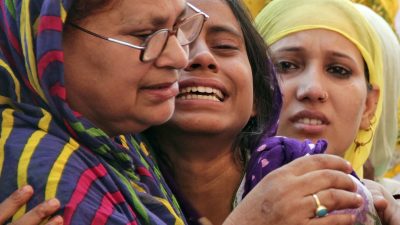Reuters photo
By
Ananya S Guha
We had Orlando, Istanbul, Dhaka, Baghdad and Medina, all at a time when the holy month of fasting was on. The closest to home was Dhaka, where a hapless Indian student along with nineteen others were hacked to death.
We are perhaps sick to hear or see the words: ”Terror Strikes.” We are a terrorised global community, despite all talk of global communities and a borderless world. The very internet which is bringing about unification is also a source of destruction, by inciting people and misleading youth to think that killing is for a divine cause. No religion sanctions that. Yet why this mayhem, this perfidy? Even if we ask these questions, the world is stunned into silence. And this silence could well be an acceptance. So long someone who is not known to us is not a victim, we do not feel the real pain and anguish of those affected. Perhaps we do not add the stricture: ”What would have happened if we were in their place.” So we either keep silent or condemn, and many a time in our condemnation we tend to generalise by spouting anger against people, race or community. That is another, sadly speaking, error of judgement.
But condemn we must against such brutal killings and their perpetrators, without thinking in terms of race, religion or colour. Can we do it, when those involved are apparently invoking the name of religion? That is the tricky, sticky if not queasy task. So, many if not most opt for silence. This is of course with the exception of political leaders who mouth platitudes and vow vengeance, but they are helpless as the rest, and they know it. This is the irony as well as the tragedy. One can do little to combat heinous acts, in open spaces, or where there are a gathering of people.
Coming to India we know that secularism is our professed social belief and we pride in our democracy and our social and religious rights. Despite this we know the truths, gross inequalities, in living standards, abysmal poverty, plight of street children. But we also rightfully protest against incidents such as the one that happened in Dadri regarding eating of beef. That was undoubtedly most unfortunate. We protest also about the killings of writers by people who think that their religion has been insulted and who we call bigots or rightists. Fine. I do that, many others do that. Fundamentalism is baneful, we agree upon that, at least many of us ‘like minded’ people, with a tilt people would call ‘leftism’. But when fundamentalism takes the most barbaric and bizarre shape, as in these recent killings in the world then pray where are the suave, broad minded ‘leftists’ ? Will their condemnation remain only in their Facebook status? This is the tightrope we must walk, without prejudice, without bias.
I am a votary for all kinds of rights, including minority rights, but I cannot for once simply keep quiet over senseless, irrational killings. Blame it on the internet, blame it on Western policies of intervention and aggrandisement, the fact is that killings are murders, and no one has the right to take laws into one’s hands. Not that killings on the basis of language and religion have not been taking place in India. They have. They are equally wrong, just as the mass massacre of a particular religious community was about fifteen years back. We have to understand this very clearly and not make condemnation of any people a fashion. Especially this when it comes to India with so much diversity, in terms of ethnicity, religion, caste or class and the secular values we hold dearly to. If we hold preciously to them we must think about precious lives, and respect for all, irrespective of the fact whether the person speaks in a different language, or belongs to a different ethnicity.
True, the world is becoming one and borderless as internet spaces are shrinking, and in effect spaces are shrinking. But what is also happening is the stark anonymity of things. At times we do not know the backgrounds of people we are talking to in this space called the web or the internet. We write for an online magazine, and we do not know it’s exact location, because it is not mentioned! as also because the world has narrowed down drastically in terms of space. And that is the obverse problem. Maintaining contacts for perpetration of crimes become easier. So on the one hand we celebrate the rights of LGBT people, great, but we do not celebrate the right to live, the right to survive in the midst of abject poverty, the right to be educated, go to school, eke out a living. What is happening to these rights in the real world, and the real is grotesquely mingled with the virtual, resulting in monstrous acts and wild chimera.
To remain starkly objective and dispassionate is the test of our times, without falling into clap traps of misplaced ideologies. To look at the root causes of violence will be another exercise one must take up independently. To reach out to people as individuals is a must for the survival of the human race. ” I love the human face/ But I fear the human race.”



No Comments Yet!
You can be first to comment this post!